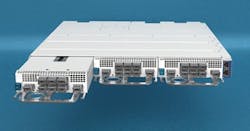FUNET, SUNET send 400 Gbps more than 10,000 km via ADVA FSP 3000 TeraFlex
ADVA (FSE: ADV) says it supported a high-speed coherent transmission field trial with CSC – IT Center for Science, which operates the Finnish University and Research Network (FUNET) and the Swedish University Computer Network (SUNET). The trial saw the research and education networks transmit 400 Gbps more than 10,000 km using the ADVA FSP 3000 TeraFlex CoreChannel platform. The network operators used two streams of 200 Gbps each to compose the 400-Gbps transmission.
The demonstration used live multi-degree flex-grid ROADM links using Raman amplification on FUNET’s fiber network in Finland and SUNET’s network in Sweden to achieve the more than 10,000-km distance. The two 200-Gbps streams occupied a 200-GHz window. Separately, FUNET has used the ADVA FSP 3000 TeraFlex to demonstrate 800 Gbps over a 2280-km network (see "FUNET, ADVA claim 800G long-haul record") and the transmission of two 200-Gbps streams in the 150-GHz band over more than 7,000 km.
“Our multi-domain field trial with the ADVA FSP 3000 TeraFlex CoreChannel terminal evaluated flexibility and the terminal’s capabilities to adapt to use cases where ultra-long-haul 400GbE services are needed. The results that were achieved – trans-oceanic reach over terrestrial systems – were far beyond our expectations and typical real-life service requirements,” said Jani Myyry, senior network specialist at FUNET. “Nordic research and education networks are shifting towards a federated next-generation model where optical spectrum resources are shared within the region. We have already built multiple programmable cross-border interconnection links between the FUNET and SUNET ADVA open line systems to exchange spectrum transparently. The trial utilized these interconnection links and the FUNET and SUNET network footprint to create the extremely transparent optical routes used during the tests.”
“SUNET operates a highly available, redundant and secure network as well as other related e-infrastructure services that ensures connectivity for our users both nationally and internationally. Being able to provide high-capacity connectivity to our scientists, researchers and educators over an extremely long-distance infrastructure without regeneration is a great advantage,” added Dennis Wallberg, network architect at SUNET. “We’re happy to be a part of this trial to show that optical networks that are designed and engineered with performance and high OSNR in mind can deliver ultra-long-haul 400-Gbps transport with ease.”
For related articles, visit the Network Design Topic Center.
For more information on high-speed transmission systems and suppliers, visit the Lightwave Buyer’s Guide.
To stay abreast of fiber network deployments, subscribe to Lightwave’s Service Providers and Datacom/Data Center newsletters.

Stephen Hardy | Editorial Director and Associate Publisher, Lightwave
Stephen Hardy is editorial director and associate publisher of Lightwave and Broadband Technology Report, part of the Lighting & Technology Group at Endeavor Business Media. Stephen is responsible for establishing and executing editorial strategy across the both brands’ websites, email newsletters, events, and other information products. He has covered the fiber-optics space for more than 20 years, and communications and technology for more than 35 years. During his tenure, Lightwave has received awards from Folio: and the American Society of Business Press Editors (ASBPE) for editorial excellence. Prior to joining Lightwave in 1997, Stephen worked for Telecommunications magazine and the Journal of Electronic Defense.
Stephen has moderated panels at numerous events, including the Optica Executive Forum, ECOC, and SCTE Cable-Tec Expo. He also is program director for the Lightwave Innovation Reviews and the Diamond Technology Reviews.
He has written numerous articles in all aspects of optical communications and fiber-optic networks, including fiber to the home (FTTH), PON, optical components, DWDM, fiber cables, packet optical transport, optical transceivers, lasers, fiber optic testing, and more.
You can connect with Stephen on LinkedIn as well as Twitter.
